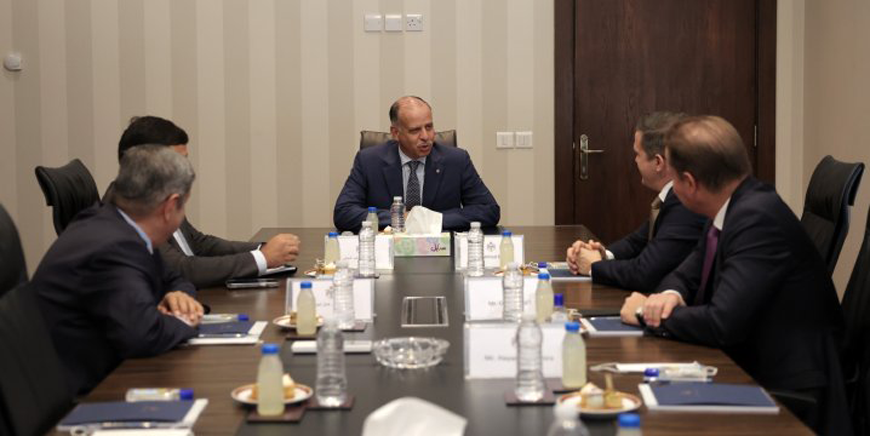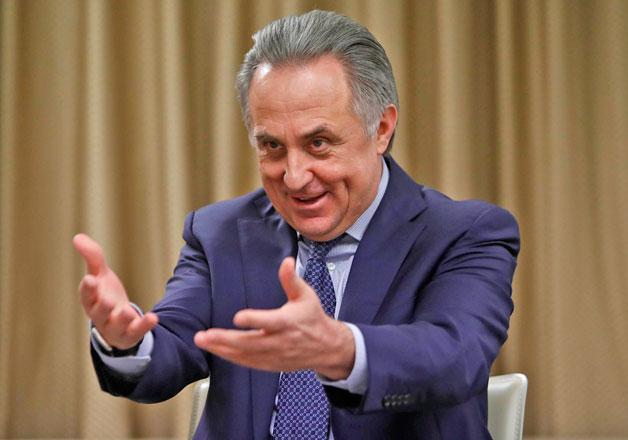You are here
Patience pays off says WADA, as Russia investigation moves on
By Reuters - Jan 23,2019 - Last updated at Jan 23,2019

Russia’s anti-doping agency Chief Yury Ganus gives a press conference in Moscow on Tuesday. Russia will not face new penalties for missing a December deadline to allow investigators access to the Moscow laboratory at the centre of alleged state-sponsored doping, the World Anti-Doping Agency said on Tuesday (AFP photo)
TORONTO — Savaged by anti-doping hardliners for their leniency in handling the Russian doping affair, the World Anti-Doping Agency (WADA) gave itself a pat on the back on Tuesday saying its patient diplomatic approach has moved the scandal closer to an end.
After provisionally reinstating the Russian Anti-Doping Agency (RUSADA) in a controversial vote in September, WADA came under attack but has argued that the decision opened the door to the Moscow laboratory and provided access to secret data that might have otherwise remained close.
It left WADA exposed to scathing criticism from athletes groups and anti-doping bodies, who felt the agency had sold out the clean athletes it was supposed to protect, by welcoming Russia back before meeting all its obligations as laid out in the Road Map to Compliance.
“If we hadn’t taken this decision in September we would be exactly where we were the day before the decision in September,” WADA Director General Olivier Niggli told Reuters. “Nothing would have moved, there would be no progress.
“Getting this data is the only way to once and for all find out who was a cheat, going after them and making sure that those who have not been cheats are cleared.”
After missing a December 31, deadline, Russian authorities, following tense negotiations, finally allowed a WADA inspection team access the Moscow lab on January 3, to extract the data.
WADA said on Tuesday it had decided not to re-impose a suspension on RUSADA despite Moscow missing the deadline.
WADA will now examine the data for any sign of tampering, while the Russian authorities must ensure any re-analysis of samples required by WADA is completed in an accredited laboratory by June 30.
The analysis will be used to prosecute drug cheats, some of whom are currently competing said Niggli, adding that that alone should be enough to satisfy athletes and silence critics complaining of WADA’s methods.
“Don’t forget all the Russian athletes except for athletics are competing,” said Niggli. “And some of this data we are going to get is from athletes that are still active so this is really making a difference on the field as opposed to grandstanding.
“Getting some clarity who did what and if you really have been a cheater you shouldn’t be there any more, I think this should be welcomed by the athletes community.
“I hope they will see it this way.”
Kid gloves
Hardliners, however, continue to believe WADA is treating Russia with kid gloves and should and only be welcomed back after all the analysis has been completed and conditions met.
RUSADA was suspended in 2015 after a WADA-commissioned report outlined evidence of systematic, state-backed doping in Russian athletics. Another report the following year documented more than 1,000 doping cases across dozens of sports, notably at the Winter Olympics that Russia hosted in Sochi in 2014.
Russia has denied the existence of state-sponsored doping in the country, but acknowledged some shortcomings in its enforcement of anti-doping regulations and indicated it would continue to cooperate with WADA.
Travis Tygart, the head of the United States Anti-Doping Agency and one of WADA’s loudest critics, conceded that retrieving the data was a positive step but still believes the Russian authorities have not acted in good faith and must be held accountable for operating a state doping programme.
“It is of course good that data was obtained, but there is still a long way to go for justice to be served as now the information out of the Moscow laboratory must be authenticated or not,” Tygart said in a statement on Tuesday.
Despite what he views as significant progress, Niggli said he accepted that no matter what WADA did there would be critics but he hoped athletes, at the end of the day, would not be among them.
“Yes there are people who make a lot of noise and call for [us to] sanction Russia, there are people who believe Russia should never be back no matter what we do,” Niggli said.
“We think we are doing justice for the athletes by getting this data and then being able to do the job we have been saying we want to do.”
Related Articles
AMMAN — HRH Prince Feisal on Wednesday met with President of World Anti-Doping Agency (WADA) Witold Banka, commending the agency's efforts t
BEIJING — The 15-year-old Russian figure skater Kamila Valieva will learn on Monday whether she can remain at the Beijing Olympics, the Cour
MOSCOW — Russian Deputy Prime Minister Vitaly Mutko on Friday urged the International Olympic Committee (IOC) to allow athletes whose doping
















